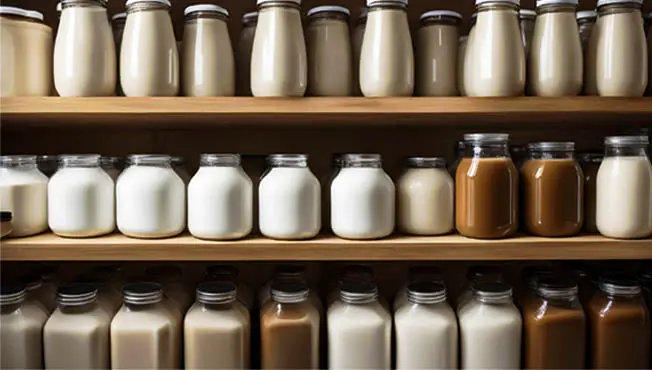Coffee creamer is a popular addition to morning routines, enhancing the flavor and creaminess of your daily brew. However, like many food products, coffee creamer comes with an expiration date. But what happens if you find yourself with a container of coffee creamer that’s past its prime? Can expired coffee creamer make you sick? In this article, we’ll explore the potential risks associated with consuming coffee creamer beyond its expiration date, the signs of spoilage to watch out for, and tips for safe storage and consumption.
Can You Use Creamer After the Expiration Date?

The short answer is that it’s usually safe to use coffee creamer after its “best by” or “use by” date has passed. These dates are provided by manufacturers as an estimate of when the product is at its freshest and of the highest quality. However, they don’t necessarily indicate when the creamer will become unsafe to consume.
Can Expired Coffee Creamer Make You Sick?

While consuming expired coffee creamer isn’t likely to make you seriously ill, there are some potential risks to be aware of. Drinking coffee with creamer that has gone bad can lead to an upset stomach, diarrhea, or a spoiled taste. However, the severity of these symptoms is typically mild and short-lived.
How Can You Tell If Coffee Creamer Has Gone Bad?

To determine whether your coffee creamer has gone bad, rely on your senses. Check for any signs of an off odor, unusual texture, or separation in the product. Additionally, if your coffee with creamer tastes sour or different from what you’re accustomed to, it’s a strong indicator that the creamer has deteriorated.
Shelf Life of Different Types of Coffee Creamers

Different types of coffee creamers have varying shelf lives. Dairy-based creamers tend to have a shorter shelf life, typically lasting a few weeks past the expiration date. Non-dairy options, such as almond or soy creamer, might last longer. It’s essential to follow the manufacturer’s guidelines and pay attention to any additional storage instructions on the packaging.
Storing Coffee Creamer for Extended Shelf Life

Proper storage can significantly extend the shelf life of coffee creamer. Keep it refrigerated at all times, tightly sealed to prevent exposure to air and moisture. This will help maintain the quality of the product even after the expiration date has passed.
Freezing Coffee Creamer

If you find yourself with an excess of coffee creamer that you won’t use before the expiration date, you can freeze it. Freezing can extend its shelf life for several months. However, be aware that freezing may alter the texture and consistency of the creamer, so it’s best suited for situations where taste and texture are less critical, such as in recipes.
Alternatives to Traditional Coffee Creamer
If you’re concerned about the shelf life of your coffee creamer, there are alternatives to consider. Non-perishable options, like powdered creamer, can have a longer shelf life due to their reduced moisture content. Additionally, many people opt for natural alternatives such as almond milk or coconut milk, which can be more stable over time.
Can Coffee Creamer Go Bad?

Coffee creamer, like many dairy and non-dairy products, can go bad over time. While it may not necessarily be harmful to consume creamer that’s slightly past its expiration date, understanding the signs of spoilage is crucial to ensure your coffee experience remains enjoyable and risk-free.
1. Off Odor: One of the primary signs that coffee creamer has gone bad is an off or sour odor. If you detect an unpleasant smell when opening the container, it’s a clear indication that the creamer has deteriorated.
2. Unusual Texture: Fresh coffee creamer should have a smooth and consistent texture. If you notice any curdling, clumping, or separation in the product, it’s a sign that the creamer is no longer suitable for use.
3. Altered Taste: An expired coffee creamer may taste sour, rancid, or simply different from what you’re accustomed to. If your coffee with creamer has an unusual or unappealing flavor, it’s best to discard it.
4. Mold Growth: While less common, mold growth can occur in coffee creamer, especially in dairy-based options. If you observe any mold, even in small amounts, do not use the creamer, as mold can produce harmful mycotoxins.
5. Expiration Date: The manufacturer’s expiration date is a helpful guideline to determine the creamer’s freshness. However, as mentioned earlier, these dates are often conservative estimates of when the product is at its best quality. Creamer may still be safe to use for some time after the expiration date, provided it doesn’t exhibit any of the spoilage signs mentioned above.
What Happens If You Freeze Coffee Creamer?

Freezing coffee creamer is a common practice to extend its shelf life, especially when you have an abundance of creamer that you may not use before it expires. While freezing can help preserve coffee creamer, it’s essential to understand what happens when you freeze it and how to do it correctly.
Texture Changes: One of the noticeable effects of freezing coffee creamer is a change in its texture. Upon thawing, you may observe that the creamer has separated or developed a slightly grainy or curdled appearance. This change in texture can be more pronounced in dairy-based creamers compared to non-dairy alternatives.
Flavor and Consistency: Freezing can also alter the flavor and consistency of coffee creamer. Some individuals may find that the thawed creamer tastes slightly different or is not as creamy as it was before freezing. However, these changes are often subtle and may not be a significant concern for all users.
Shelf Life Extension: When stored in the freezer at a consistently low temperature, coffee creamer can remain safe to consume for an extended period, potentially beyond its original expiration date. This can be particularly helpful if you want to prevent wastage or stock up on creamer when it’s on sale.
Separation and Mixing: If your coffee creamer separates after freezing, a good shake or stir can often restore it to a more consistent texture. Mixing well before using the creamer can help distribute any separated components.
Considerations for Freezing Coffee Creamer:
- Packaging: Ensure that the creamer is stored in an airtight container or freezer-safe bag to prevent freezer burn and odors from affecting its taste.
- Portioning: Consider dividing the creamer into smaller portions before freezing, so you can thaw only what you need to minimize the number of freeze-thaw cycles.
- Thawing: To thaw frozen coffee creamer, place it in the refrigerator for several hours or overnight. Avoid microwaving, as it can lead to further texture changes.
- Usage: While frozen and thawed coffee creamer may not be ideal for adding to your coffee due to the texture changes, it can still be suitable for use in recipes like soups, sauces, and baked goods where the altered texture may not be as noticeable.
In summary, freezing coffee creamer is a practical way to extend its shelf life and reduce waste. While it may lead to changes in texture, these can often be mitigated through thorough mixing. When done correctly, freezing coffee creamer can be a valuable method for ensuring you always have creamer on hand without concern for it expiring.
Food Poisoning from Expired Coffee Creamer: Risks, Symptoms, and Prevention
Many of us enjoy adding a dash of coffee creamer to our morning brew to elevate the flavor and creaminess of our coffee. However, few consider the potential risks associated with consuming expired coffee creamer. While it’s easy to overlook the expiration date on these dairy and non-dairy products, doing so can lead to unpleasant consequences, including food poisoning. In this article, we’ll explore the risks, symptoms, and prevention of food poisoning from expired coffee creamer.
The Risks:
Expired coffee creamer can pose health risks due to bacterial contamination and spoilage. Several factors contribute to these risks:
- Bacterial Growth: Over time, microorganisms can multiply in creamer, especially in dairy-based ones. Bacteria such as Staphylococcus aureus, Salmonella, and Escherichia coli (E. coli) can proliferate, leading to potential foodborne illness.
- Spoilage: Beyond bacterial concerns, coffee creamer may undergo spoilage, causing changes in taste, texture, and appearance. Spoiled creamer is a clear sign that it’s not safe for consumption.
Symptoms of Food Poisoning:
Consuming expired coffee creamer that is contaminated or spoiled can result in a range of food poisoning symptoms. These may include:
- Gastrointestinal Distress: Nausea, vomiting, diarrhea, and stomach cramps are common symptoms of food poisoning.
- Fever: In some cases, individuals may experience a fever as the body’s response to bacterial contamination.
- Dehydration: Diarrhea and vomiting can lead to dehydration, which may require medical attention if severe.
- Weakness and Fatigue: Food poisoning can leave you feeling weak and fatigued due to the body’s efforts to fight off the harmful bacteria.
Prevention:
To reduce the risk of food poisoning from expired coffee creamer, consider the following preventive measures:
- Check Expiry Dates: Always check the “best by” or “use by” date on the coffee creamer packaging and discard any products that have expired.
- Storage: Store creamer in a cool, dry place, and refrigerate it once opened to prolong its shelf life.
- Good Hygiene: Wash your hands before handling coffee creamer and ensure that utensils and containers used with creamer are clean.
- Alternative Uses: If you suspect your coffee creamer is nearing its expiry date, consider using it in cooking or baking where changes in taste and texture are less noticeable.
- Buy in Smaller Quantities: If you don’t use coffee creamer frequently, consider purchasing smaller containers to minimize the chances of expiration.
How Long Does Coffee Creamer Last Before It Goes Bad?

The shelf life of coffee creamer varies depending on the type of creamer, its ingredients, and how it is stored. Here’s a general guideline for different types of coffee creamer:
- Dairy-Based Creamer: Unopened dairy-based coffee creamer, such as liquid half-and-half or flavored creamers, typically lasts 1 to 2 weeks past its “use by” or “best by” date when refrigerated. Once opened, consume it within 7 to 10 days. Freezing unopened dairy-based creamer can extend its shelf life by a few months.
- Non-Dairy Creamer: Unopened non-dairy coffee creamer, like powdered or liquid non-dairy creamers, can have a longer shelf life. It may remain good for 1 to 2 months past its “use by” or “best by” date when stored in a cool, dry place. Once opened, non-dairy creamer should be used within 2 to 4 weeks. Freezing unopened non-dairy creamer can also prolong its shelf life, typically by several months.
- Flavored or Sweetened Creamers: Coffee creamers with added flavors or sweeteners may have a shorter shelf life, especially if they contain dairy. These should be consumed within the recommended time frames mentioned for their respective types.
- Powdered Creamer: Unopened powdered coffee creamer can last for several months beyond the “use by” date, provided it’s stored in a cool, dry place. Once opened, the shelf life of powdered creamer is shorter, about 2 to 6 months. Freezing unopened powdered creamer can help maintain its quality for an extended period.
It’s important to note that the “use by” or “best by” date on the packaging is a guideline for quality, not safety. While using creamer after this date might not make you sick, it could lead to changes in taste, texture, or appearance. To minimize the risk of consuming spoiled coffee creamer, inspect it for any signs of spoilage, such as an off odor, curdled texture, or visible mold, before using it. Proper storage, such as refrigerating opened dairy-based creamer or sealing unopened creamer in an airtight container, can also help maintain its quality and safety for longer periods.
Final word
While expired coffee creamer is unlikely to pose significant health risks, it’s still important to be vigilant and use your senses to determine its quality. Pay attention to the signs of spoilage, and make sure to store your creamer properly to maintain its freshness. Ultimately, if you’re unsure about the safety of your coffee creamer, it’s best to err on the side of caution and consider alternative options for your daily coffee indulgence. For further insights into coffee and its various aspects, you can also explore these informative articles:
With these guidelines and additional insights, you can make informed choices about your coffee creamer and enjoy your daily cup of coffee without worries.

